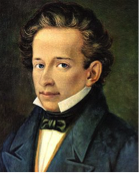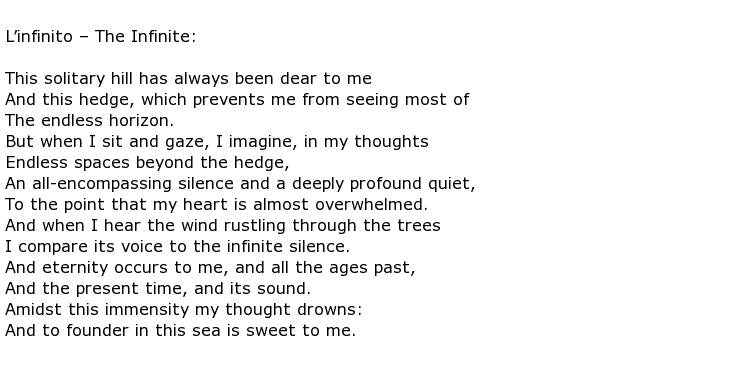 Giacomo Leopardi was a 19th century Italian nobleman who was one of the leading lights in the Romantic poetry movement which was a part of the Age of Enlightenment. This was a period that began in the previous century, dominating intellectual and philosophical thinking across the whole of Europe. Leopardi was able to participate fully in this despite living in a remote part of Italy which was dominated by the rigours of the Catholic church. Beside writing a great deal of critically acclaimed lyrical poetry in his relatively short life he was also a renowned philologist and philosopher.
Giacomo Leopardi was a 19th century Italian nobleman who was one of the leading lights in the Romantic poetry movement which was a part of the Age of Enlightenment. This was a period that began in the previous century, dominating intellectual and philosophical thinking across the whole of Europe. Leopardi was able to participate fully in this despite living in a remote part of Italy which was dominated by the rigours of the Catholic church. Beside writing a great deal of critically acclaimed lyrical poetry in his relatively short life he was also a renowned philologist and philosopher.
He was born Giacomo Taldegardo Francesco di Sales Saverio Pietro Leopardi on the 29th June 1798 in Recanati which is a town in the northern region of Marche. It was a noble family, his father being the Count Monaldo Leopardi, and everyone in that region adhered strictly to papal law. Despite this though the Count had squandered much of the family’s fortunes on gambling and it was left to Giacomo’s mother, the Marquise Adelaide Antici Mattei, to bring her steely determination to bear in her efforts to recover the situation. Despite all this the boy had a happy childhood and this is described in one of his poems, Le Ricordanze.
Leopardi was taught by priests which was a family tradition and soon proved himself a more than able student. He had a talent for studying languages and was soon able to both read and write in Hebrew, Greek and Latin. His thirst for knowledge was intense and, during his teenage years, he applied himself whole-heartedly to the acquisition of yet more. It is believed that he saw a good education as his passport to escape the strict home regime in which he lived. Unfortunately though his body was not strong enough to give him even the simplest of youthful pleasures. He suffered constantly with illness and it is believed that his spine was irreparably damaged by the disease known as ankylosing spondylitis.
Keen to escape the constraints of the family home, Leopardi managed to arrange a visit to an uncle in Rome some time during 1822 but he soon became disillusioned by the toxic atmosphere of decadence and corruption that he found in the city. It was not the glorious centre that the classical papers that he had read described to him. Like any young man he had amorous hopes and ambitions but these too were crushed as his physical condition deteriorated.
Over the next few years he travelled to major cities – Bologna, Florence and Pisa amongst others – and was commissioned to write poetry by the owner of a bookshop in Milan. This was short-lived though and he was forced to return home in 1828 because of his poor health. He went back to Florence two years later and worked on such pieces as the Canti. This was financially rewarding and enabled Leopardi to live independently for a time, writing a great deal of poetry and studying philosophy. Here is an example of his lyrical style of writing. It is a poem called

This simple piece was in stark contrast to other works such as his 1816 Inno a Nettuno (Hymn to Neptune). Leopardi composed this entirely in Ancient Greek and it was so authentic that literary critics thought it was actually an original Greek classic until they discovered that it had been produced in much more recent times. He added to his considerable body of original work with translations of ancient compositions such as the first book of the Odyssey and the second book of the Aeneid.
During his mid-30s he continued to travel and, in 1837, he found himself in Naples where it was hoped that the climate might benefit him but, tragically, there was a cholera epidemic sweeping the region and it claimed his life, along with many others.
Count Giacomo Leopardi died on the 14th June 1837 at the age of 38.

